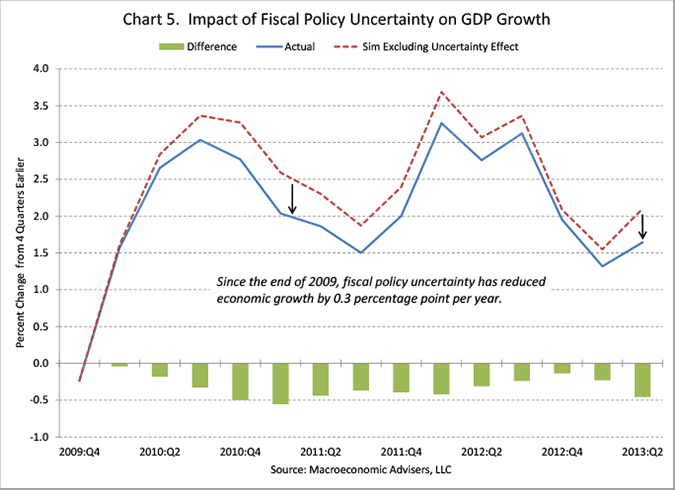Private collection
*****************************************
Business Insider
Joe Weisenthal Oct. 15, 2013, 5:53 AMA new study put together by Macroeconomic Advisors tallies the impact of all the sham "fiscal crises" created by Washington since the financial crisis. These include the various debt ceiling, government shutdown, and fiscal cliff standoffs, none of which were necessary, and all of which had a role in slowing the economy.
Here's the press release (via Morning Money).
Report Finds that Fiscal Policy Uncertainty
has Resulted in 900,000 American Jobs Lost
has Resulted in 900,000 American Jobs Lost
Ongoing Brinksmanship and Failure to
Raise Debt Ceiling Could Cause Another Recession
Raise Debt Ceiling Could Cause Another Recession
NEW YORK — As
Congressional leaders and the President discuss a potential temporary
solution to the current fights over the government shutdown and the debt
ceiling, the repeated cycle of lurching from crisis to crisis has
significant costs to the U.S. economy, according to a new report
released today.
The macroeconomic analysis, "The Cost of
Crisis-Driven Fiscal Policy," quantifies the negative economic impact of
governing by crisis, and examines the effects of Washington’s actions —
and inactions — including events such as sequestration, the government
shutdown, and brinksmanship over the debt ceiling.
The report concludes that crisis-driven
government and the resulting fiscal policy uncertainty has directly
harmed the American economy by increasing the unemployment rate by 0.6%,
or the equivalent of 900,000 jobs. "The Cost of Crisis-Driven Fiscal
Policy" was prepared by Joel Prakken of Macroeconomic Advisers, LLC, a
leading independent research firm, for the Peter G. Peterson Foundation.
Michael A. Peterson, President and COO of
the Peter G. Peterson Foundation, said: "This report makes clear that
self-created fiscal crises have significant costs to our economy and to
American families. These partisan battles not only threaten our fragile
economic recovery, but they have not resulted in any comprehensive
solution to our real fiscal challenge, stabilizing our long-term debt."
"Partisan divided government has failed
to address our long-term fiscal challenges sensibly, instead encouraging
policy that is short-sighted, arbitrary, and driven by calendar-based
crises," said Prakken of Macroeconomic Advisers. "Based on this report's
findings, we can assert confidently that the crisis-driven fiscal
policies of the last several years have damaged our still-struggling
economy. One can only hope that our policymakers will implement more
sensible policy in the future."
The entire report is available here.
Additional top-level findings include:












No comments:
Post a Comment
Hello and thank you for visiting my blog. Please share your thoughts and leave a comment :)